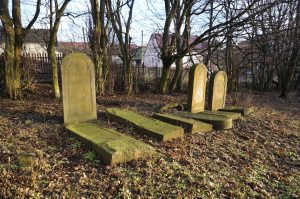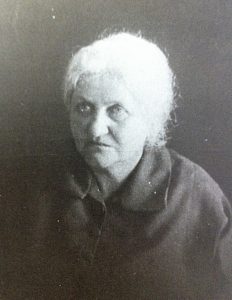(This is a chapter from Jack Glotzer’s memoir, I Survived the German Holocaust Against All Odds. Click here to return to the Table of Contents.)

Jack Glotzer’s grandmother Leah Barban was buried in Rohatyn’s new Jewish cemetery in an unmarked grave; the exact burial place is unknown today. The few standing and fallen stones, as seen here in 2018, are nearly all that remain from those set before the war.
One day in July 1942 my mother left me to watch my grandmother, Leah Barban (she lived with us in the ghetto). My grandmother was sick with typhus. She was holding my hand. I kept looking at her; she opened her eyes, looked at me and stopped breathing. She expired. We had a problem burying her. Some people came to pray and to wash her. But nobody was willing to help us bury her. So, my brothers, two of my cousins and I, carried her to the cemetery.[47] The cemetery was far from the ghetto. It was a hot day. We had difficulties carrying her. Then we had to dig the grave; the soil was hard. We took turns as we had only one shovel.
As I previously indicated, I loved my grandmother very much. She was very respected, even by the gentiles. She was a midwife; she delivered about 90% of the babies in town.
We were grieving for her, but on the other hand we were grateful to God that she died a natural death (although from a sickness).
[47] Leah Barban was likely buried in the “new” Jewish cemetery in Rohatyn, just over 1km north of the town square; the cemetery entrance is on vul. Turianskyi. – Ed.
 Published by the Ukrainian Center for Holocaust Studies, (UCHS), Kyiv. This work is licensed under the Creative Commons Attribution-NonCommercial-NoDerivatives 4.0 International License. To view a copy of this license, visit http://creativecommons.org/licenses/by-nc-nd/4.0/ or send a letter to Creative Commons, PO Box 1866, Mountain View, CA 94042, USA.
Published by the Ukrainian Center for Holocaust Studies, (UCHS), Kyiv. This work is licensed under the Creative Commons Attribution-NonCommercial-NoDerivatives 4.0 International License. To view a copy of this license, visit http://creativecommons.org/licenses/by-nc-nd/4.0/ or send a letter to Creative Commons, PO Box 1866, Mountain View, CA 94042, USA.
<- Back to the previous section

